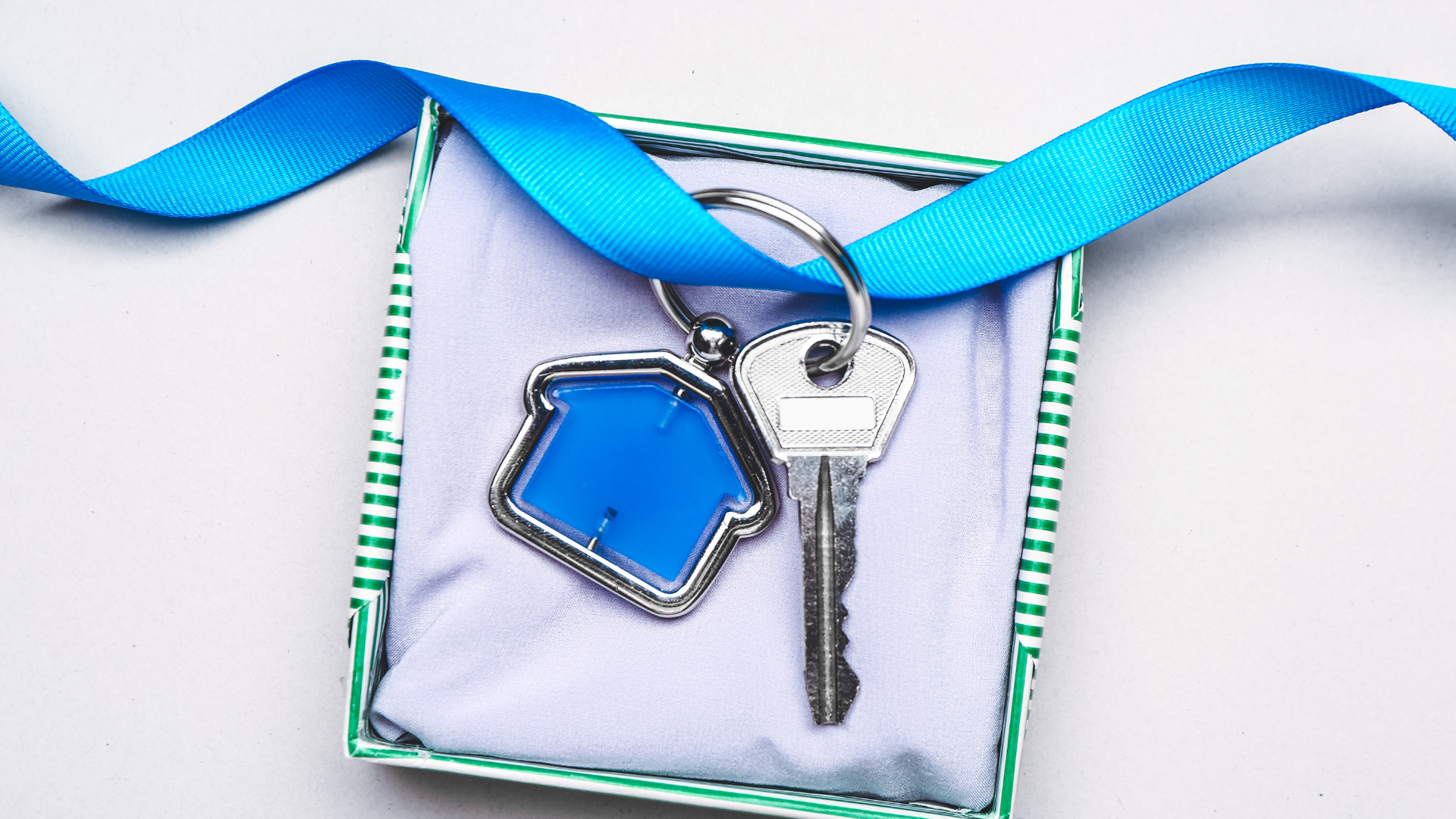- What is a Gifted Deposit?
- Who Can Gift You a Deposit?
- Benefits of Using a Gifted Deposit
- Limitations of Using a Gifted Deposit
- Which Mortgage Lenders Accept Gifted Deposits?
- How to Get a Mortgage with a Gifted Deposit
- Repaying the Gifted Deposit
- Can Equity Be Used as a Deposit?
- What Are the Tax Implications of Gifted Deposits?
- Are There Alternatives to Gifted Deposits?
- Key Takeaways
- The Bottom Line
A Guide To Gifted Deposits For Mortgages

Saving for a mortgage deposit can be tough, right? Many find it challenging to scrape together the large sum needed to secure a home.
This is where gifted deposits come in handy. They’re a popular way to help you jump the hurdle of the initial deposit required to buy a property.
Gifted deposits not only make it easier to buy your home but also open up access to better mortgage deals.
This guide covers everything you need to know about gifted deposits for mortgages.
What is a Gifted Deposit?
A gifted deposit is simply money given to you to help buy your home. The best part? You don’t have to pay it back. This is different from a loan, where you’d have to worry about extra debt.
The person who gives you the money, like your parents or a good friend, won’t own any part of your property either.
There are two main types of gifted deposits. One could cover your entire deposit; that’s a full-gifted deposit. Or, it might just be part of the deposit; that’s a partially gifted deposit.
Either way, it means less stress about gathering enough money and more focus on moving into your new place.
Who Can Gift You a Deposit?
Most lenders prefer gifts from close family members like your parents, grandparents, or siblings. However, some lenders may also accept gifts from:
- Friends
- Distant relatives, though usually require more proof to ensure the gift is genuine and not a loan.
It’s worth noting that deposits gifted by someone selling you the house, often a family member, are generally not accepted due to potential conflicts of interest.
Additionally, there can be legal limitations on who can ‘gift’ a deposit, which your lender can help clarify for you.
Benefits of Using a Gifted Deposit
Getting a gifted deposit can be a great way to get a mortgage when you’re looking to buy a home. Here’s why it could be a great option for you:
- You’re more likely to get your mortgage approved because you have a larger deposit.
- You could get access to better mortgage deals with lower interest rates. This is because lenders see you as less risky if you have a bigger deposit.
- You could save money every month because your mortgage payments might be lower.
- There’s no need for you to pay back the money. So, you can focus on enjoying your new home without worrying about extra debt.
- The person who gives you the money won’t own any part of your property. They’re just helping you out.
Limitations of Using a Gifted Deposit
While a gifted deposit can help you step onto the property ladder, there are a few things to watch out for:
- Not all lenders accept gifted deposits, and those that do may need more checks and paperwork.
- You’ll need to prove the money is a gift, not a loan. This usually means getting a letter from the person giving you the money.
- There could be tax implications if the person who gives you the gift passes away within seven years of giving it.
- The money must come from a legal source, so expect your lender to ask for evidence, like bank statements from the donor.
- If the gift comes from someone other than a close family member, lenders might be stricter or even not accept the gift.
Knowing these pros and cons can help you decide if a gifted deposit is the right way for you to buy your new home.
Which Mortgage Lenders Accept Gifted Deposits?
Many lenders in the UK accept gifted deposits, especially when they come from immediate family members. The acceptance and terms can vary by lender and the specifics of the mortgage product.
Here are some of the major lenders known to accept gifted deposits:
- Lloyds Bank
- Halifax
- Nationwide Building Society
- Barclays
- HSBC
- Santander
- Virgin Money
These lenders usually require a gift declaration to be completed, stating that the deposit is indeed a gift and not a loan and that the donor does not expect any repayment or hold an interest in the property.
It’s also common for lenders to request proof of the origin of the funds to comply with anti-money laundering regulations.
Always check the specific criteria and requirements with your chosen lender. It’s best to consult a mortgage advisor to ensure you meet all the necessary conditions for using a gifted deposit.
How to Get a Mortgage with a Gifted Deposit
Using a gifted deposit for your mortgage can be a fantastic way to get on the property ladder sooner.
But before you start house-hunting, there are a few things to sort out to make things smooth sailing with your lender.
Here’s a breakdown of what you need to do:
1. Prove Your Deposit is a Gift
Imagine your lovely mum or grandma is helping you out with a deposit. To make things official with the mortgage lender, you’ll need a signed letter from them stating it’s a gift, not a loan.
This ‘gifted deposit letter’ should include:
- A statement confirming it’s a gift
- The amount of the gift
- Names of the donor and recipient
- Confirmation that there is no need for repayment
- Confirmation that the donor has no rights over the property
- How you’re related to the donor
- The lender’s name and a statement that the gift doesn’t affect their position
- The property address
- Evidence showing the money is from a legitimate source, like the donor’s savings
- A statement showing the donor’s financial stability
- Signatures and the date from the donor, you, and a witness
Don’t worry, your mortgage advisor can usually give you a template for this letter, so you don’t have to write it all yourself.
2. Gather Required Mortgage Documents
While your kind gifter is sorting their letter, you’ll need to gather some documents too.
This is to help the lender make sure everything is above board and you can handle the mortgage repayments. Your donor will need to provide things like:
- Photo ID (driving licence or passport)
- Proof of address (utility bill or bank statement)
- Bank statements showing the gift money coming from their account
Remember to check your credit score too. If there are any mistakes, get them fixed before applying for a mortgage.
The solicitor you’ll use when buying your house will likely need similar documents from you and your gifter.
3. Consult a Mortgage Broker
Consider getting help from a mortgage broker. Here’s why a mortgage broker is a great idea:
- They compare deals from different lenders to find the one with the lowest interest rate and best terms for you.
- They can explain all the complicated mortgage jargon, including about gifted deposits.
- They handle the mountains of paperwork, saving you tons of time and stress.
- They can help you avoid any nasty surprises by giving personalised advice.
- They can speed up the mortgage approval process by dealing directly with lenders on your behalf.
Using a broker can save you time, money, and a whole lot of stress.
To get started, reach out to us. We’ll connect you with a good mortgage broker who can help you find suitable mortgage deals for your situation.

Repaying the Gifted Deposit
If you need to repay the money used for your deposit, it’s not a gift—it’s a loan. Lenders see this differently because it means you have extra debt.
This will add up to your Debt-to-income ratio (DTI) – the percentage of how much of your income goes to your monthly debts each month.
This helps leaders understand if you can afford the mortgage repayments on top of everything else you owe.
Here’s an example to help you understand:
Let’s say you’ve received a £30,000 deposit as a gift from your parents. Since this is a gift, you don’t need to repay anything. Your only monthly debts are a £200 car payment and a £150 student loan payment.
If you earn £3,000 a month, your DTI calculation would be:
| Description | Amount (£) |
|---|---|
| Car Payments | £400 |
| Student Loan Payments | £200 |
| Total Monthly Debts | £600 |
| Divided by | / |
| Total Monthly Income (Before Taxes) | £2,000 |
| Multiplied by | 100 |
| Debt-to-income ratio | 30% |
A lower DTI makes you an attractive candidate for mortgage lenders.
Now, for instance, your £30,000 deposit is a loan you must repay, with monthly payments of £600. Here’s how lenders calculate your DTI:
| Description | Amount (£) |
|---|---|
| Deposit (Loan) | £600 |
| Car Payments | £400 |
| Student Loan Payments | £200 |
| Monthly Debts | £1,200 |
| Divided by | / |
| Monthly Income (Before Taxes) | £2,000 |
| Multiplied by | 100 |
| Debt-to-income ratio | 60% |
In this case, your DTI exceeds 50%, which significantly decreases your chances of mortgage approval. Lenders might view your financial situation as risky since more than half of your income goes towards debt repayment.
Ideally, a good DTI is below 43%. But, the lower your DTI, the higher the chances you’ve got in securing a mortgage.
Paying back your deposit makes securing a mortgage more challenging, but not impossible—especially if your income is stable and reliable.
Some lenders might still offer you a mortgage if your deposit is a loan, depending on your overall financial situation.
If the loan for your deposit is secured against the property, it can complicate things further.
Lenders prefer a clear situation where your deposit is a true gift with no repayments needed. This keeps your debt levels lower and makes the mortgage process smoother.
Can Equity Be Used as a Deposit?
Yes, equity can be used as a deposit towards a new property purchase. Some homeowners opt to release equity through remortgaging to fund a deposit. However, this approach can be costly.
When you release equity, you’re essentially taking out a loan against your property’s value. This increases your overall debt.
On the other hand, some sellers or developers can help you get onto the property ladder through a concessionary purchase or vendor-gifted deposits. This happens when you buy a home from someone at a price below its market value.
For example, if the home is worth £300,000 and they sell it to you for £250,000, the £50,000 difference is considered a gift of equity.
The seller could be a family member, a company, or even an acquaintance.
It’s wise to consult with a mortgage advisor to assess your financial situation and determine if this strategy is suitable for you.
What Are the Tax Implications of Gifted Deposits?
The most direct impact is related to inheritance tax. If the person who ‘gifted’ you the deposit passes away within seven years of giving the gift, the money could be counted as part of their estate, and inheritance tax may be due.
Gifts from parents or grandparents can often be ‘potentially exempt transfers.’ If the donor survives for seven years after giving the gift, it won’t be taxed as part of their estate under inheritance tax rules.
Additionally, everyone has a £3,000 tax-free gift allowance each year. This means up to £3,000 given as a gift each year won’t have any immediate tax implications.
For larger gifted deposits, the rules under UK tax law can get quite complex. That’s why it’s a good idea to talk to a tax professional. They can give you tailored advice based on your specific situation, helping ensure everything is handled correctly.
Are There Alternatives to Gifted Deposits?
Not everyone can afford to give a cash gift. Here are some alternatives that can still help family members get onto the property ladder:
This is where a family member deposits cash into a linked savings account as security for your mortgage. It’s locked in for a few years, but they get their money back with interest if you keep up with mortgage payments.
A family member or friend guarantees your mortgage repayments. This means they agree to cover any payments if you can’t. It’s a big responsibility and carries risks for the guarantor, especially if things go wrong.
You can buy a property together with a family member. This combines incomes, which might help you borrow more.
But, watch out for extra stamp duty costs. If the family member already owns a home, buying another property might attract higher stamp duty rates, and if they sell their share later, they could face capital gains tax.
Key Takeaways
- A gifted deposit is money someone – a close family member or friend – gives you to help buy a home, and you don’t have to pay it back or share ownership of the property.
- It can help you get a mortgage faster, secure better rates, and lower monthly payments by increasing your deposit size.
- To use a gifted deposit, you need a signed letter confirming it’s a gift, not a loan, and proof that the money comes from a legal source, like savings or inheritance.
- Gifts may be subject to inheritance tax if the donor passes away within seven years, so check with a tax expert.
- Alternatives include family springboard mortgages, guarantor mortgages, joint mortgages, or using equity from your current home as a deposit.
The Bottom Line
So, there you have it!
Using a gifted deposit can be a brilliant way to boost your chances of getting on the property ladder.
If you’re thinking about buying your first home, remember, planning is everything.
Getting advice from a mortgage advisor can make a big difference. They can guide you through the details and make sure everything goes smoothly.
Need a broker? Get in touch with us. We’ll connect you with a good mortgage broker who can search the whole market and get you the best deal using a gifted deposit.
Get Matched With Your Dream Mortgage Advisor...

Frequently asked questions
Can I skip the process of writing a gift declaration with a solicitor and just put it in my bank account?
Yes, you can skip the process of writing a gift letter with a solicitor. Some lenders provide their gift declaration forms, hence a solicitor isn’t always necessary.
The key is the donor completing a gift letter that confirms the money is a gift, not a loan. This should include details like their name, the amount gifted, and their relationship to you.
This helps the lender verify the source of the funds and avoid any delays in your mortgage approval.
For larger gifts or complex situations, a solicitor might be helpful to ensure everything is in order.
Do I always need a gift declaration letter regardless of the amount for a mortgage deposit?
To get a mortgage with a gifted deposit, you typically need a gift declaration letter regardless of the amount. This letter confirms the money is a gift, not a loan.
It should include details like the donor’s name, the amount gifted, and their relationship to you.
Mortgage lenders require this letter to ensure the funds aren’t another loan burdening you. It verifies the source of the money, fulfilling both lender and regulatory requirements for tracing your deposit’s origin.




